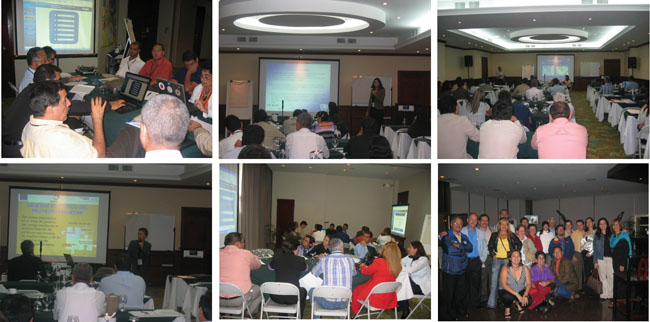Workshop:
Foundations for Strengthening the Municipal Information System for Disaster Prevention in Latin America and the Caribbean
In accordance with the Hyogo Framework for Action 2005-2015 and adhering in particular to point three of the framework’s priorities for action, the regional workshop “Foundations for Strengthening the Municipal Information System for Disaster Prevention in Latin America and the Caribbean, was held in the city of San José, Costa Rica from Monday April 23rd through Thursday April 26th.
This workshop served to validate the system as a prototype resulting from a year long pilot project with the financial support of the Canadian International Development Research Center (IDRC) through the Urban Poverty and Environment Programme and Environmental Management Secretariat for Latin America and the Caribbean, technical support from the United Nations International Strategy for Disaster Reduction The Americas (UN/ISDR) and implemented by the Regional Disaster Information Center for Latin America and the Caribbean (CRID). With participation of approximately 60 representatives from throughout the region, workshop participants concurred, seemingly unanimously, that this type of system indeed meets with an existing need in the region as an instrument that has great potential for promoting disaster prevention and local risk management among local governments within the region.
Findings, recommendations and proposals:
Participants concluded that this prototype does in fact meet with a real need in the region for readily available information surrounding disaster prevention and local risk management available to the user in a systematic way and of no additional cost besides that of accessing internet. While acknowledging that the system is in need of further development thus requiring investment, it was determined that such an investment is indeed worthwhile and this pilot project should be pursued.

Photo: CRID
Participants agreed to contribute to the system’s sustainability through the provision of informational resources, promotion of the tool within their respective countries, sectors or areas of thematic focus and dissemination among local governments in their geographic focus areas.
Technical and operational recommendations were made surrounding the system’s design, content, use and applicability as well as target population.
In conclusion, the system was deemed to be entirely feasible and worthwhile given the ease of access provided to its users with orientation for encountering documentation and tools at no additional cost and easily accessible to a wide variety of users who can in turn further disseminate such information. It was also deemed a highly useful tool for providing input to support local decision-making. Positive aspects include the system’s accessibility, low implementation costs and potential to act as a network and/or clearinghouse for actors involved in disaster prevention and information for supporting local government decision-making.
While a memory of the workshop and CD-Rom will be available in June, information concerning workshop contents is available through the project website at
http://www.crid.or.cr/crid/idrc/municipalidades.htm.
For further information:
municipalidades@crid.or.cr
|

